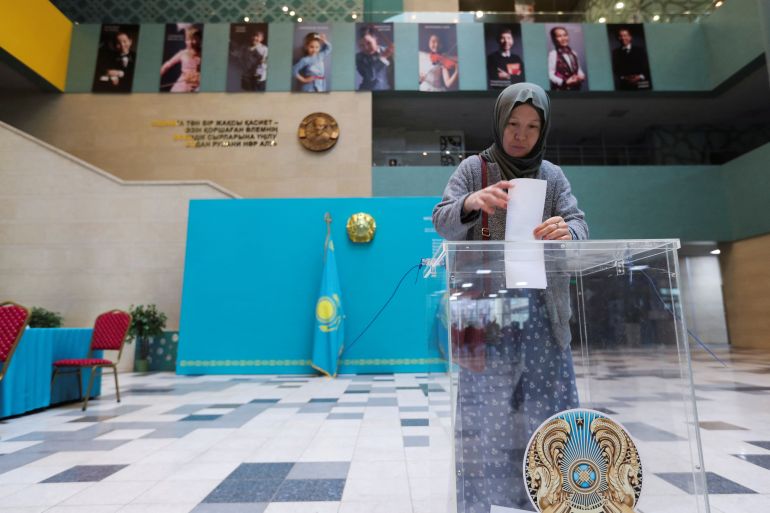Kazakhstan holds referendum to amend constitution
The constitutional reform spearheaded by President Kassym-Jomart Tokayev marks the end of Nazarbayev’s rule.

Polling stations have closed in Kazakhstan for a referendum to overhaul the constitution, as the Central Asian nation’s President Kassym-Jomart Tokayev aims to reform the political system after the three-decade rule of founding leader Nursultan Nazarbayev.
The constitutional reform is part of a drive for a “New Kazakhstan” spearheaded by Tokayev, who was hand-picked by Nazarbayev to replace him as president in 2019.
Keep reading
list of 3 itemsKazakh president becomes party chair after sidelining Nazarbayev
Kazakhstan detains ex-defence minister for inaction during unrest
It moves to decentralise decision-making and allow greater representation of various groups in parliament, as well as preventing relatives of the president from holding government positions.
Tokayev has described the vote as a shift from “super-presidential” rule that will strengthen parliament and do away with Nazarbayev’s privileges, including the constitutional title of Elbasy, or Leader of the Nation.
“We are … laying the foundation for the Second Republic,” Tokayev said, addressing the nation on the eve of the vote.
The referendum, which amends one-third of the current constitution that was accepted by the popular vote in 1995, is likely to give 69-year-old Tokayev the political capital to run for a second term without the backing of Nazarbayev.
The new president fully emerged as an independent figure this year, after subverting an attempted coup in January and removing Nazarbayev and his relatives from key positions in the government.
January’s unrest started as a protest against a fuel price rise and evolved into a broad display of public discontent with a system which concentrates power and wealth in the hands of a few.
The uprising killed more than 230 people and prompted authorities to call in troops from a Russia-led security bloc.
Prior to January’s crisis, Tokayev was widely seen as ruling in the shadow of Nazarbayev, who in 2019 handed in his abrupt resignation after three decades in power.
Opposition groups have seen the vote that brought Tokayev to power as rigged in favour of Nazarbayev’s chosen successor.
Critics say Sunday’s plebiscite is an attempt by Tokayev to legitimise his rule and formalise the retirement of his predecessor through amendments drafted without the participation of civil society.
Joanna Lillis, a journalist and the author of “Dark Shadows: Inside the Secret World of Kazakhstan,” told Al Jazeera that the substance of the proposed changes included “very few limits to presidential power.”
“The president will retain the right to appoint the prime minister, to appoint key ministers in the cabinet, to veto laws and all the other powers that the president has enjoyed for all these years,” Lillis said.
If approved, the amendments would strip Nazarbayev of his privileges as founding father but not limit Tokayev’s authority.
Demonstrators who took to the streets in January had called for sweeping reforms including the right to elect local representatives, who are appointed by the president. Tokayev has not granted this concession, offering instead to put forward at least two candidates for local councils to vote on.
“People are very disappointed,” Lillis, adding that it was unclear whether Tokayev would succeed in using the referendum to “reset his relation” with the people after the violent crackdown.
Despite the criticism of the amendments and their scope, there has been no visible “no” campaign and the referendum – the second in the country’s history – is likely to pass.